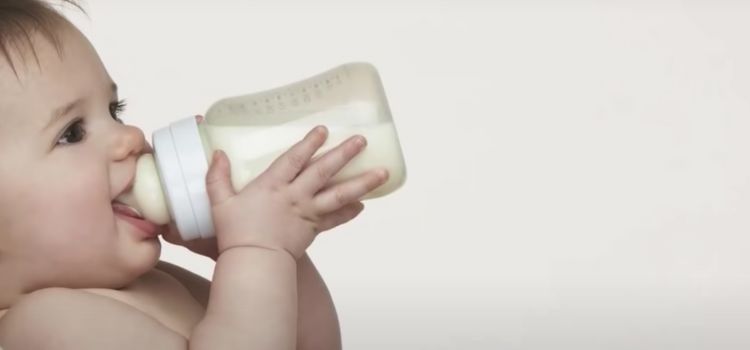As an Amazon Associate I earn from qualifying purchases.
For many parents, bottle-feeding their child is a priceless opportunity for bonding. But sometimes, while your child is sipping milk, you can hear a clicking noise. We will examine How to Stop Baby Clicking When Bottle-Feeding in this blog article and provide you with practical methods to assist you overcome this frequent problem. So continue reading if you want to know how to get your baby to stop clicking while they’re being fed by the bottle!

Briefly explain the issue of baby clicking while bottle feeding
When their baby is being bottle-fed, many parents have seen their child clicking when they take a sip from the bottle. Both the infant and the parent may find this clicking problem to be unsettling and distressing. But, there are solutions available to deal with and get rid of infant clicking while being bottle-fed. In order to reduce or eliminate the clicking sound and provide a more pleasant feeding experience for their infant, parents should use appropriate bottle placement, check that the latch is strong, and regulate the flow of the bottle nipple.
Highlight the importance of addressing this issue for the baby’s comfort and proper feeding
It is crucial to handle a baby’s clicking sound during bottle feeding in a way that promotes comfort and ensures proper eating. An infant who clicks during bottle feeding may experience pain, have trouble latching on, or drink insufficient amounts of milk. Parents may help their children have more pleasant feeding experiences by learning how to stop their babies from clicking while they are being bottle-fed.
Clicking sounds may be avoided and smoother, more efficient feeding sessions can be encouraged by putting strategies into practice like as selecting the appropriate bottle and nipple size, making sure the latch is right, and feeding at a calm, steady pace. In order to provide the infant with the best possible comfort and nutrition, it is imperative that the appropriate measures be taken to resolve this problem.
Understanding the Clicking Sound:
Explain what causes the clicking sound during bottle feeding
There are many possible causes for the clicking sound that happens while feeding a bottle. An incorrect latch, in which the baby’s mouth fails to seal tightly around the nipple, is one frequent reason. This may cause air to be drawn in with the milk, which would explain the clicking sound. A rapid milk flow, in which the milk comes out too quickly for the infant to manage, is another potential reason. They may gulp and swallow air as a consequence, making clicking noises. Make sure your baby latches onto the bottle properly, and think about using a slower flow nipple to control the flow of milk, to help prevent infant clicking.
Emphasize the need to identify the underlying reasons to effectively resolve the issue
Finding the underlying causes of a baby’s clicking behavior during bottle feeding is essential to solving the problem successfully. Parents and carers may handle an issue more effectively by using specific methods and procedures once they understand its core cause. By identifying the precise causes of infant clicking—such as latch problems, tongue tie, or incorrect bottle placement—caregivers may intervene appropriately to ease the baby’s pain and guarantee a more satisfying eating experience. For successful bottle feeding to be promoted and effective remedies to be found, the underlying causes must be addressed.
Reasons for Baby Clicking When Bottle Feeding:
1. Improper Latch:
Discuss how an incorrect latch can lead to clicking sounds
Clicking noises during bottle feeding is often the consequence of an improper latch. These annoying clicking noises might indicate that the infant isn’t latching onto the bottle nipple correctly. The clicking sound is caused by air entering the feeding system when the baby’s mouth is not tightly closed around the nipple. Getting a good latch on the bottle is essential to stop the baby from clicking. The infant should be placed upright, the bottle nipple should be positioned in line with the baby’s nose, and the nipple should be carefully pushed into the baby’s mouth. Establishing a proper latch takes time, but it may reduce clicking noises and make feedings more pleasant for the baby and the carer.
Provide tips on achieving a proper latch to prevent clicking
It’s important to have a correct latch on bottles to Stop Baby Clicking When Bottle Feeding. Here are a few useful hints to guarantee a tight latch and avoid clicking. First, place your infant with their head slightly raised and in a semi-upright posture. Next, to minimize air intake, make sure the bottle nipple is loaded with milk and inclined slightly upward. Before completely placing the nipple into the baby’s mouth, gently touch their lips. Then, wait for them to expand wide. Make certain that their lips are flanged outward to enclose the nipple. To aid achieve a solid latch, also ensure sure the baby’s tongue is below the nipple. By following these guidelines, bottle feeding clicks may be significantly decreased and pleasant feeding sessions for the infant and carer can be encouraged.
2. Tongue-Tie:
Explain how tongue-tie can contribute to clicking while bottle feeding
Babies’ clicking sounds during bottle feeding may be caused in part by tongue ties. The little bit of tissue that connects the tongue to the bottom of the mouth is either shorter or tighter than usual in babies with tongue-tie. This may limit the baby’s ability to move their tongue, which might make it challenging for them to correctly latch onto the bottle. Consequently, when the infant tries to eat, it could produce a clicking sound. It is essential to treat the tongue-tie problem in order to stop the infant from clicking during bottle feeding. Getting expert assistance from a pediatrician or lactation consultant may provide direction on several methods to enhance the baby’s latch and feeding experience.
Suggest seeking professional help to address tongue-tie issues
Your baby can have a tongue tie if they are clicking while bottle feeding. The condition known as tongue tie arises from excessive tightness in the tissue that connects the tongue to the floor of the mouth, leading to challenges in feeding and speech development. It is advised to get expert assistance in order to handle this problem. A pediatrician or lactation consultant, for example, can evaluate your baby’s health and provide the right treatments. It’s imperative that you get expert assistance to make sure your baby gets the care they need to stop the clicking sound and have a better feeding experience.
3. Flow Rate:
Discuss how a fast or slow flow rate can cause clicking sounds
During bottle feeding, clicking noises may occur from a rapid or slow flow rate, which may be uncomfortable for the infant and the carer. An infant may find it difficult to keep up with swallowing if the flow rate is excessively rapid, which might result in air being swallowed and making clicking sounds.
Conversely, a sluggish flow rate may make the infant suck more forcefully, which would create a vacuum that would cause the nipple to collapse and make clicking noises. Selecting a bottle nipple that fits the baby’s feeding requirements and making sure the latch is correct are crucial steps in preventing the infant from clicking during bottle feeding. Monitoring the flow rate on a regular basis and making necessary adjustments might also assist to resolve the problem.
Provide recommendations on selecting the appropriate bottle nipple for the baby’s age and feeding preferences
There are a few important things to take into account when choosing the best bottle nipple for your baby’s age and feeding habits. First and foremost, it’s essential to choose a nipple that is appropriate for your baby’s age range. Different nipple flow rates (from slow to rapid) are usually supplied to meet the changing demands of growing babies.
Don’t forget to take your baby’s feeding preferences into account. Some newborns could have a preference for a nipple of a certain size or kind, such as a silicone or latex nipple, or one that is broad or narrow. You and your child may have a more pleasant and joyful feeding experience if these aspects are taken into consideration.
4. Bottle Positioning:
Explain how improper bottle positioning can lead to clicking
When a baby is bottle-fed, incorrect bottle posture often results in clicking noises from the bottle. An infant will swallow down air along with milk when the air becomes caught in the nipple, resulting in clicking. The infant may get uncomfortable as a consequence, and their milk intake may be ineffective. When bottle feeding, it’s crucial to make sure the bottle is positioned appropriately to prevent infant clicking.

Ascertain that the infant’s head is slightly raised and that the bottle is angled just enough to maintain the milk-filled nipple. This makes it possible for milk to flow continuously without absorbing too much air, which lessens the chance of clicking. Frequently releasing any trapped air and preventing clicking may also be achieved by burping the infant both during and after feedings.
Offer guidance on holding the bottle at the correct angle to prevent clicking
It’s crucial to hold the bottle at the proper angle to Stop Baby Clicking When Bottle Feeding. You’ll get the help you need from our detailed guide to get your baby to quit clicking during bottle feedings. Make sure the infant is standing up straight and that their head is slightly raised first. In order to prevent air from getting inside, tilt the bottle gently and make sure the nipple is full of milk. As the infant is able to sip from the bottle without gulping or making clicking noises, adjust the angle as necessary. You can make sure that your baby has a pleasant and hassle-free feeding experience by adhering to these easy guidelines.
5. Air Intake:
Discuss how excessive air intake can result in clicking sounds
During bottle feeding, excessive air intake often results in clicking noises, which may be uncomfortable for the infant and the carer. The infant makes these clicking noises when they can’t seal the bottle properly, which allows extra air to enter along with the milk or formula. Gas, colic, and fussiness may result from this, which may be upsetting for the infant.
A good latch and placement are essential to avoid infant clicking during bottle feeding. Selecting a bottle nipple that corresponds with the infant’s age and feeding preferences may also aid in lowering air intake and minimizing clicking noises. Furthermore, releasing trapped air by often burping the infant during and after feeding may help relieve pain and prevent it.
Provide tips on minimizing air intake during bottle feedings, such as using anti-colic bottles or paced feeding techniques
When nursing a baby, it’s important to limit air intake to avoid clicking and discomfort. If the baby clicks during bottle feeding, you may want to use anti-colic bottles, which are made with less air intake. Special features include venting systems that enable air to escape from the bottle, minimizing the quantity of air your infant inhales. Paced feeding is another useful method. You may let your baby eat at their own rate by gently tilting the bottle to regulate the milk’s flow. By doing this, air swallowing and possible clicking noises are reduced. You can make sure that your child has a more comfortable and joyful bottle-feeding experience by putting these suggestions into practice.
6. Bottle Size and Shape:
Explain how using the wrong bottle size or shape can contribute to clicking
When feeding a baby via bottle, the clicking sound may be caused in part by using the incorrect size or shape of a bottle. For the baby’s age and feeding requirements, the bottle size should be suitable. If the bottle is too tiny, the infant may have to suck harder to get enough milk, which may sound like clicking. Similarly to this, using a bottle that isn’t shaped correctly might result in a faulty latch and clicking sounds. Selecting the ideal bottle size and shape for your child can help ensure that they are fed comfortably and effectively, which will help prevent your infant from clicking during bottle-feeding sessions.
Recommend experimenting with different bottle options to find the most suitable one for the baby
One useful tactic to deal with the problem of stop Baby Clicking When Bottle Feeding is to try out several bottle alternatives. You can select the best bottle design and nipple shape to avoid clicking and provide your child with a pleasant feeding experience by experimenting with several designs. It’s crucial for the baby’s health and the parents’ peace of mind to know when to stop clicking while they’re bottle feeding. Thus, don’t be afraid to experiment with several bottle alternatives until you determine which one is best for your child.
7. Teething or Oral Sensitivity:
Discuss how teething or oral sensitivity can cause clicking while bottle feeding
When a baby is bottle feeding, they may make clicking noises due to teething or oral irritation. The infant may find it difficult to correctly latch onto the bottle nipple as a consequence of discomfort or soreness in the gums. The underlying reason for infants clicking during bottle feeding has to be addressed in order to stop it. To assist ease the baby’s pain, you might provide a cold teething toy or gently massage the baby’s gums before eating. Furthermore, a bottle nipple with a slower flow rate or one made especially for teething newborns might make eating more pleasant.
Suggest using teething remedies or consulting a pediatric dentist if necessary
When your baby clicks during bottle feeding, it may indicate that they are having trouble with their teeth. It is advised to recommend utilizing teething medications or, if required, contacting a pediatric dentist in order to ease this problem. You may assist relieve your baby’s teething discomfort and stop them from clicking during bottle feeding by using teething treatments like teething rings or giving a cold washcloth to the gums. A pediatric dentist may also provide further advice and support in helping you to manage your baby’s pain associated with teething.
How to Stop Baby Clicking When Bottle Feeding:
Summarize the previous reasons and highlight the importance of addressing each one individually
For the sake of the infant’s comfort and the whole feeding experience, it is essential to address the causes of the baby’s clicking during bottle feeding. Parents may successfully address this problem by summarising the preceding reasons and emphasizing the significance of resolving each one separately.
Parental control over feeding procedures and averting pain for their infant may be achieved by using appropriate strategies and comprehending the underlying problems, such as tongue tie, high palate, or poor latch. By taking the time to address each issue separately, you may enhance the baby’s feeding experience while also encouraging a positive and healthy parent-child bonding relationship.
Provide a step-by-step guide on troubleshooting and resolving the clicking issue
With this detailed instruction on diagnosing and fixing the problem, you can stop your infant from clicking during bottle feeding. A clicking sound made by your infant while feeding might be a sign of difficulty with swallowing or latching.
To start, make sure the infant is positioned correctly for a healthy seal by checking their latch. Whenever necessary, reposition their head and torso.
Second, check to see whether your baby’s breast flow is suitable for their age and stage of development. A flow that is too rapid or too sluggish may result in clicking.
Third, look for oral health problems that might interfere with swallowing, such as tongue knots. Speak with a medical expert if required.
Finally, to promote a more synchronized pattern of sucking and swallowing, practice timed bottle-feeding methods. You can help get rid of the clicking sound and make sure your baby has a better feeding experience by doing these steps.

Conclusion
In conclusion, the fundamental issues surrounding the problem to Stop Baby Clicking When Bottle Feeding has been emphasized in this essay. We’ve spoken about how crucial it is to search for the best answer for your child with perseverance and patience. Although it might be annoying, it’s important to keep in mind that this problem can be fixed with the right methods and modifications. Thus, keep experimenting, get advice from medical experts if necessary, and trust that you will discover the most effective way to stop the clicking sound. Keep in mind that you can guarantee a seamless and pleasant feeding experience for your infant and yourself with some time and effort.
Amazon and the Amazon logo are trademarks of Amazon.com, Inc, or its affiliates.